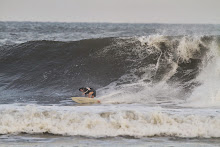Up at 5:45 AM. Brutal cell phone, doesn’t know how loud it is. Also doesn’t know that when I fumble it off, it doesn’t mean “snooze”. The second alarm reminds me how out of control I am.
One last check of email before heading to the internet desert that is LAX.
Check the coastal forecast just out of habit.
Whoops, Tsunami watch. Big quake in Chile, 8.8.
Google around for a while. Looks like Southern California has some protection. In 1960, a similar quake sent a tsunami that devastated Hawaii. Hawaii is on “alert”, so probably something will hit there.
For a marine scientist, or even someone who plays in the ocean, a tsunami is the strangest, beastly thing. It is as if your cherished ocean is transformed. Video footage of the big one that swept the Indian Ocean a few years back was jaw dropping. People perched in multi-story buildings watching the water level rise, a river of strangeness where there once was a predictable ocean. People who can’t climb higher are plucked off the building, and swept away by the irresistible current.
I think often how I would react if a big earthquake hit our home in Venice. What would I do? Would I scream at my Bird, “Get your wetsuit on quick, grab a boogey board we have to race to high ground.” Of course, high ground (greater than 40 feet above sea level) is a mile away. The wave period of a tsunami is 15 min. The odds are against us, if it is the 40-foot waves that rang the Indian Ocean’s bell.
Bird is asleep, fighting a new winter cold. The taxi is waiting for me. “Bird, there’s been a big earthquake in Chile. They’ve issued a tsunami watch for LA. Warning for Hawaii. Don’t think anything will come of it, but if you hear a commotion of police sirens or whatever, that situation’s changed.” Strange way to leave a loved one for 4 weeks. Still, I got a sleepy loving kiss out of the deal.
Heading to Costa Rica for a month. Everyone I talk to thinks I’m going there to surf. I guess I will have to surf to make them feel properly jealous.
But first I have to spend a week dissecting out Dolabrifera brains and carefully, cleanly, preparing them for a “molecular genetic analysis”.
Dolabrifera is the slug that doesn’t sensitize. You can give it as much electric shock as you want to, and its reflexes won’t get stronger. Do that to our California sea hare, Aplysia, and for hours it reacts to the slightest wisp of a touch as if the sky is falling. It pulls in, not just the piece that is touched, but everything into a round ball of cringing slug. Aplysia learns.
Dolabrifera doesn’t.
It is hard to believe that I’m sitting in LAX, swimming in the anxiety of travel; leaving behind my familiar house, my loving Bird, and the security of routine, in order to study a sea hare that doesn’t learn.
But I am. There you have it. Sabbaticals are the most improbable things. My colleague at Chapman, Walter Piper, has a verb for this, “Wrong-footing”. He likes to do it to his students, surprise them with a weird question, keep them off balance.
This sabbatical has been wrong-footing me. It keeps me off balance. It forces me to think a little differently. It wakes me up.
Here's Miami's mobile charging station (sent my blog from here). Fly to CR shortly.


